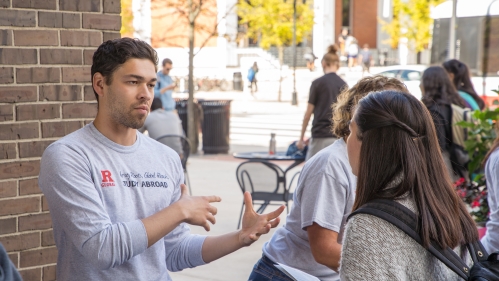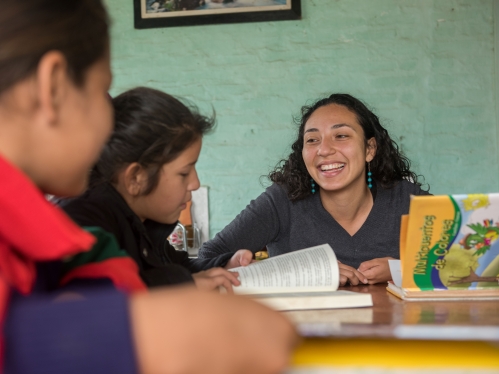
Academic Planning
As you plan your study abroad program, please remember to consider academic and degree requirements and discuss options with the Rutgers Global–Study Abroad team, Academic Advisors, and Chair/Undergraduate Program Director. It is important to link your learning abroad experience with your degree program at Rutgers.
Course Planning & Academic Advising
Step 1: Meet with your Study Abroad Advisor to discuss course options and how to access syllabi.
Step 2: Consult the Study Abroad Course Equivalency Database to review the courses already approved for Rutgers equivalents. (Note, you are able to request a course to be added to the database -- see the Course Approval process below)
Step 3: Create an academic plan on Table A of the Course Planning Form to present to your Academic Advisor based on study abroad courses available & your degree requirements.
Step 4: Meet with your School’s Academic Advisor to discuss your study abroad plans; choose courses and back-up options.
- Plan which degree requirements will be fulfilled abroad (major, minor, Core, general elective).
- Research study abroad course offerings to fulfill those requirements.
- List desired study abroad courses.
*Note, students can take courses abroad for general elective credit that do not have Rutgers equivalent.

Course Approvals
To request approval for courses not listed in the Course Equivalency Database, complete Table B of the Course Planning Form.
Step 1: Bring study abroad course descriptions and/or syllabi to the Chair or Undergraduate Program Director of the Rutgers department that would offer that course. Please be sure that these course descriptions and syllabi are complete and translated into English if written in another language. Also list credits abroad and equivalent Rutgers credits for the course. Please share the link to the “Academics” section of your Study Abroad Program page with the approving Undergraduate Program Director/Chair.
Step 2: Have the Chair or Undergraduate Program Director fill out a row on Table B for each course approval. Be sure all sections are complete.

Form Submission
Step 1: Scan and upload completed form to your study abroad application BEFORE departure. (If you have trouble uploading your form, you may submit it to ru_abroad@global.rutgers.edu)
Step 2: Once abroad, if you take different courses that need approval, you will need to submit a new Table B on the Course Planning Form. You can do this when we request your final schedule.
Please consult your Study Abroad Advisor if you have any questions about this process.

Posting Study Abroad Credits on Your Rutgers Transcript
For most study abroad programs at Rutgers, it takes approximately 6-12 weeks for the partner university to send an official transcript to Rutgers Global–Study Abroad. Upon receiving the transcript, the Study Abroad office will work with the Rutgers Registrar's office to post the course, the credits, and grades (based on the course equivalency form) to your Rutgers transcript. It is your responsibility to check your Rutgers transcript and the Degree Navigator to ensure that your study abroad courses are appropriately reflected. If you have any issues, please email ru_abroad@global.rutgers.edu

Study Abroad Academic Policies
Please review the course equivalency guidelines for students

Frequently Asked Questions
-
Not necessarily. Partner universities can’t guarantee enrollment in their classes. Partner institutions adjust course offerings periodically and each partner has its own policy on what type of courses are available for exchange students. In addition, the class may fill up or there could be a timetable conflict. Please be sure to have 4-5 first choices and 4-5 second choices as a backup-up plan. Please look into the host institution’s course listing for the specific term you will be studying abroad as the authoritative registration guide.
-
In these cases, you will see multiple entries in the database approved by different Rutgers schools or departments. For example, one same course at a partner institution can be approved by New Brunswick School of Engineering and Camden School of Arts and Sciences. While the same course can be used to fulfill multiple graduation requirements if approved, a student can only earn credit/GPA once for the same course.
-
No. You certainly can take courses not yet listed in the database. The database is an evolving project and more courses are being added to the database each semester. If you wish to enroll in a course that is not in the database, you will need to go through the course equivalency process. If approved for a course equivalency by the department, Rutgers Global will add the course to the database. We appreciate each faculty member and student who helps to grow the database.
-
For a course to be reflected on a student’s Rutgers transcript, the partner institution’s course must match the course number, course title and the number of credits noted in the database or the Course Equivalency Form. If the course title changes or the number of credits are adjusted, a re-evaluation will be necessary. Students are responsible for making sure information in this database directly corresponds to host university enrollment.
-
Study abroad credits earned through Rutgers Global-approved study abroad partners are regarded as Rutgers credits and are guaranteed to count towards the overall requirements of Rutgers degree. Study abroad grades are also counted in the student’s term and cumulative GPA. Transfer credits are credits earned by Rutgers students through courses offered by non-approved Rutgers institutions. Transfer credits, if approved transferrable, do not count towards Rutgers GPA.
-
Yes, study abroad courses taught in languages other than English will count as credits earned towards the graduation total. If the course is evaluated as a Rutgers equivalent course by the undergraduate dean/chair, you can use it towards your major, minor or CORE requirements. If the syllabi provided by the partner institution is not in English, the study abroad office can provide translation before students submit the syllabi for department evaluation.
